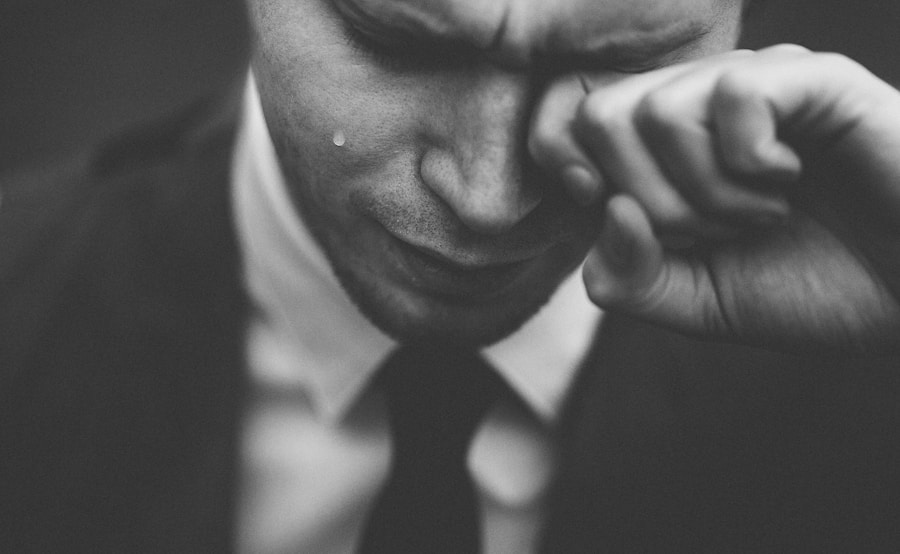Anger is often viewed as a natural emotion, yet when it comes to men, societal perceptions can complicate this sentiment. You may have noticed that expressions of anger in men are frequently met with a mix of admiration and disdain. On one hand, there is a cultural narrative that glorifies the ‘angry man’ as a figure of strength and assertiveness; on the other, there exists a stigma that labels such expressions as toxic or dangerous.
This duality creates a confusing landscape for men, who may feel pressured to conform to traditional masculine ideals while grappling with the consequences of their anger. The stigma surrounding male anger can lead to a cycle of suppression and explosion. You might find that many men are taught from a young age to suppress their emotions, particularly those deemed ‘weak’ or ‘vulnerable’.
This suppression can manifest as an inability to express feelings in a healthy manner, leading to outbursts that are often viewed negatively. The fear of being judged or labelled as ‘aggressive’ can prevent men from seeking help or discussing their feelings openly. As a result, anger becomes not just an emotion but a burden, one that many carry in silence, fearing the repercussions of vulnerability.
Summary
- Male anger is often stigmatized and misunderstood, leading to negative stereotypes and reluctance to seek help.
- Root causes of male anger can stem from societal expectations, childhood experiences, and unresolved trauma.
- Unaddressed anger can have detrimental effects on men’s mental health, leading to increased risk of depression, anxiety, and substance abuse.
- Society perpetuates male anger issues through toxic masculinity, lack of emotional support, and limited outlets for healthy expression.
- Strategies for managing male anger include therapy, mindfulness, communication skills, and seeking support from trusted individuals.
Understanding the Root Causes of Male Anger
The Socialisation of Boys
From a young age, boys are often socialised to embody traits such as toughness and stoicism. This conditioning can lead to an internal conflict when they experience emotions that contradict these ideals, such as sadness or fear. Consequently, anger may become the default emotional response, as it is more socially acceptable than vulnerability.
Personal Experiences and Trauma
Moreover, personal experiences such as trauma, loss, or chronic stress can exacerbate feelings of anger in men. You might consider how unresolved issues from childhood or significant life events can create a volatile emotional landscape. For some men, anger serves as a protective mechanism—a way to shield themselves from deeper feelings of pain or inadequacy.
A Compassionate Approach
Understanding these root causes is crucial for addressing male anger effectively; it allows for a more compassionate approach that acknowledges the complexities behind the emotion rather than simply labelling it as problematic.
The Impact of Anger on Men’s Mental Health

The repercussions of unchecked anger on men’s mental health can be profound and far-reaching. You may recognise that persistent anger can lead to a range of mental health issues, including anxiety, depression, and even substance abuse. When anger is not managed properly, it can create a vicious cycle where negative emotions feed into one another, leading to an overall decline in mental well-being.
This cycle can be particularly damaging because it often goes unnoticed until it manifests in more severe ways. Additionally, the impact of anger extends beyond the individual; it can strain relationships with family, friends, and colleagues. You might observe that men who struggle with anger often find themselves isolated, as loved ones may distance themselves due to fear or frustration.
This isolation can further exacerbate feelings of loneliness and despair, creating a feedback loop that reinforces negative emotional states. Recognising the impact of anger on mental health is vital for fostering healthier emotional expressions and encouraging men to seek support when needed.
How Society Perpetuates Male Anger Issues
Society plays a significant role in perpetuating issues related to male anger. You may have noticed that media representations often glorify aggressive male characters while simultaneously vilifying those who express vulnerability. This portrayal reinforces the notion that anger is an acceptable form of expression for men, while other emotions are not.
Such narratives can create unrealistic expectations for how men should behave and respond to their feelings, leading to confusion and frustration when they inevitably experience emotions outside this narrow framework. Furthermore, societal norms often discourage open discussions about mental health among men. You might find that conversations around emotional well-being are frequently dominated by stereotypes that suggest men should ‘man up’ or ‘tough it out’.
This cultural pressure can prevent men from seeking help or engaging in meaningful conversations about their feelings. As a result, many men may feel trapped in their emotional experiences, unable to break free from the societal constraints that dictate how they should express themselves.
Strategies for Managing and Coping with Male Anger
Managing and coping with male anger requires a multifaceted approach that acknowledges both the emotional and practical aspects of the issue. You might consider adopting strategies such as mindfulness and relaxation techniques to help regulate your emotional responses. Practices like deep breathing exercises or meditation can provide you with tools to pause and reflect before reacting impulsively.
By cultivating awareness of your emotions, you can create space for healthier expressions of anger rather than allowing it to dictate your actions. Another effective strategy involves developing communication skills that enable you to articulate your feelings constructively. You may find it beneficial to practice expressing your emotions in a calm and assertive manner rather than resorting to aggression or withdrawal.
Engaging in open dialogues with trusted friends or family members can also provide an outlet for your feelings while fostering deeper connections. By learning to communicate effectively about your anger, you can transform it from a destructive force into an opportunity for growth and understanding.
Seeking Help: Overcoming Barriers to Men’s Mental Health Support

Breaking Down the Barriers
It is crucial to recognise these obstacles and work towards dismantling them in order to foster a culture where seeking help is seen as a strength rather than a weakness. One way to overcome these barriers is by promoting open conversations about mental health within your social circles. You might consider sharing your own experiences or encouraging others to do so in order to normalise discussions around emotional well-being.
Seeking Supportive Environments
Additionally, seeking out supportive environments—whether through therapy groups or community organisations—can provide you with the resources needed to navigate your feelings more effectively. By actively challenging the stigma surrounding men’s mental health, you can contribute to creating a more supportive landscape for yourself and others.
Creating a Culture of Openness
By working together to break down these barriers, we can create a culture where men feel empowered to speak openly about their emotions and seek help when needed. This, in turn, can lead to improved mental health outcomes and a more supportive community for all.
The Connection Between Anger and Other Mental Health Issues in Men
Understanding the connection between anger and other mental health issues is essential for addressing the complexities of male emotional experiences. You may find that anger often coexists with conditions such as anxiety and depression, creating a tangled web of emotions that can be difficult to untangle. For instance, feelings of inadequacy or fear may manifest as anger when they become overwhelming, leading to explosive reactions that further complicate one’s mental health landscape.
Recognising this interplay between emotions is vital for effective treatment and support. You might consider exploring therapeutic approaches that address not only anger but also underlying issues such as anxiety or depression. Cognitive-behavioural therapy (CBT), for example, can help you identify patterns in your thoughts and behaviours that contribute to your emotional state.
By addressing these interconnected issues holistically, you can work towards achieving greater emotional balance and well-being.
Promoting Healthy Expressions of Emotions for Men
Promoting healthy expressions of emotions among men is crucial for fostering a more compassionate society where vulnerability is embraced rather than shunned. You may find that encouraging open discussions about feelings within your community can help dismantle harmful stereotypes surrounding masculinity. By creating safe spaces for men to share their experiences without fear of judgement, you contribute to a culture where emotional expression is valued.
By equipping boys with the tools they need to understand and articulate their feelings, we can help break the cycle of suppression and aggression that often characterises male anger. Encouraging activities such as art therapy or group discussions can also provide alternative outlets for emotional expression, allowing men to explore their feelings in constructive ways.
In conclusion, addressing male anger requires a comprehensive understanding of its roots, impacts, and societal influences. By fostering open conversations about emotions and promoting healthy coping strategies, you can contribute to a culture where men feel empowered to express their feelings without fear or stigma. Ultimately, embracing vulnerability and seeking support are essential steps towards achieving emotional well-being for all individuals, regardless of gender.
FAQs
What are anger issues?
Anger issues refer to difficulties in controlling or managing feelings of anger. This can manifest as frequent outbursts, aggression, or a general inability to cope with anger in a healthy way.
What are the signs of anger issues in men?
Signs of anger issues in men may include frequent irritability, physical aggression, verbal abuse, difficulty expressing emotions other than anger, and a tendency to blame others for their anger.
What causes anger issues in men?
Anger issues in men can be caused by a variety of factors, including unresolved trauma, stress, substance abuse, and underlying mental health conditions such as depression or anxiety.
How do anger issues affect men’s mental health?
Untreated anger issues can have a significant impact on men’s mental health, leading to increased stress, relationship problems, and a higher risk of developing other mental health conditions such as depression or anxiety.
What are the potential consequences of untreated anger issues in men?
Untreated anger issues in men can lead to strained relationships, legal issues, physical health problems, and a decreased quality of life. It can also contribute to a cycle of escalating anger and aggression.
How can men seek help for anger issues?
Men can seek help for anger issues by reaching out to a mental health professional, such as a therapist or counsellor. There are also support groups and anger management programmes available to help men learn healthy coping strategies.




















